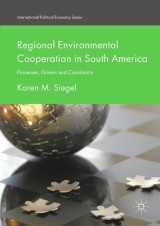Details

Regional Environmental Cooperation in South America
Processes, Drivers and ConstraintsInternational Political Economy Series
|
53,49 € |
|
| Verlag: | Palgrave Macmillan |
| Format: | |
| Veröffentl.: | 16.08.2017 |
| ISBN/EAN: | 9781137558749 |
| Sprache: | englisch |
Dieses eBook enthält ein Wasserzeichen.
Beschreibungen
<p>This book examines cooperation on shared environmental concerns across national boundaries in the Southern Cone region of South America, specifically Argentina, Brazil, Paraguay and Uruguay. It covers regional environmental cooperation in the Southern Cone since the early 1990s. By using the marginalised issues of ecological and socio-environmental concerns as an analytical lens, the author makes a significant contribution to the study of regional cooperation in Latin America. Her book also presents the first detailed study of how environmental cooperation across national boundaries takes place in a region of the South, and thus fills a lacuna in global environmental governance. This innovative work is geared toward students and scholars of environmental politics, regional cooperation in Latin America, and transboundary environmental governance.<b></b></p>
<p></p><p>Chapter 1: Introduction.- Chapter 2: From neo-liberalism to neo-extractivism.- Chapter 3: From “open” to “post-hegemonic” regionalism.- Chapter 4: Regional environmental cooperation in the La Plata river basin.- Chapter 5: Species protection at the regional level: the Convention on Migratory Species in the Southern Cone.- Chapter 6: Conclusion.</p><p><b></b></p><p><b></b></p><p><b></b></p><p><b></b></p><p><b></b></p>
<p>Karen M. Siegel is Lord Kelvin Adam Smith Research Fellow in the School of Social and Political Sciences at the University of Glasgow, UK. She has been a visiting researcher at the Facultad Latinoamericana de Ciencias Sociales (FLACSO) Argentina and she is an elected member of the Society for Latin American Studies (SLAS) Committee as well as a Research Fellow of the Earth System Governance Project.</p><p></p>
<p>This book examines cooperation on shared environmental concerns across national boundaries in the Southern Cone region of South America, specifically Argentina, Brazil, Paraguay and Uruguay. It covers regional environmental cooperation in the Southern Cone since the early 1990s. By using the marginalised issues of ecological and socio-environmental concerns as an analytical lens, the author makes a significant contribution to the study of regional cooperation in Latin America. Her book also presents the first detailed study of how environmental cooperation across national boundaries takes place in a region of the South, and thus fills a lacuna in global environmental governance. This innovative work is geared toward students and scholars of environmental politics, regional cooperation in Latin America, and transboundary environmental governance.<br/></p>
A study of regional cooperation on shared environmental concerns across national boundaries in the Southern Cone region of South America The first detailed study of how environmental cooperation across national boundaries takes place in a region of the South Charts the progress of cooperation in the Southern Cone region Includes supplementary material: sn.pub/extras
A study of regional cooperation on shared environmental concerns across national boundaries in the Southern Cone region of South America<br>The first detailed study of how environmental cooperation across national boundaries takes place in a region of the South<br>Charts the progress of cooperation in the Southern Cone region<br>
“This book fills an important gap in the study of environment and development. Regional environmental cooperation in the global South has expanded, but as it is less visible and different than in the North, it is much less studied and understood. Besides clarifying the nature and the dynamics of environmental cooperation in the case of the Southern Cone of South America, Karen Siegel offers valuable analytical tools and insights to this nascent field of inquiry. A useful and timely book for scholars of International Relations, International Development Studies, Environmental Politics and Latin American Studies.” (Barbara Hogenboom, Centre for Latin American Research and Documentation (CEDLA), University of Amsterdam, the Netherlands)<p></p>
Diese Produkte könnten Sie auch interessieren:

Inclusión educativa de niños, niñas y adolescentes migrantes venezolanos, en Colombia

von: Douglas Jiménez

15,99 €
















